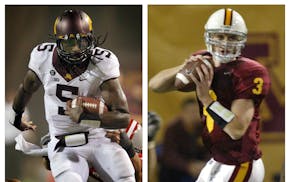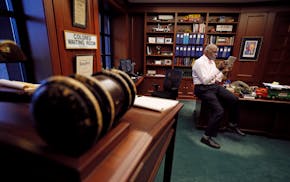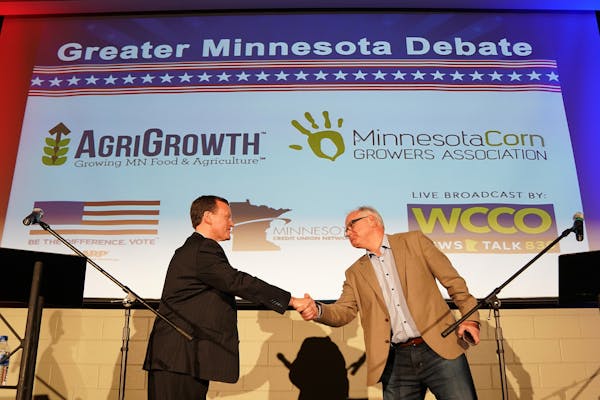Ever wonder why Minnesota's firearms deer season coincides with the rut?
Friends of the late Ed Chilgren — a state politician who championed the outdoors starting with his first election in 1926 — can explain. The gregarious DFLer, who was born in Sweden, fought in World War I with the U.S. Marines and rose to become Speaker of the House in 1959, wanted it that way.
"He was instrumental in getting it changed,'' said Doug Reichert, a former Federal Cartridge employee who hunted in Chilgren's northwoods deer camp for many years. "He wanted to hunt at the best time of year for bucks.''
The story is plausible, but the exact origin of the state's early November firearms season is still undocumented and subject to varied interpretations by hunters and game officials alike. Left for debate is why Minnesota's midcentury practice of staging the firearms deer season close to Thanksgiving — still the case in Wisconsin — was ditched in the late 1950s and early 1960s. That's when Chilgren was at the height of his political powers.
The small-town newspaper publisher from Littlefork in Koochiching County was re-elected as house speaker in 1961 and loomed large until deciding not to run in 1964. He had been a lifer on the Game and Fish Commission.
It wasn't until 1977 that the DNR solidified "the Saturday closest to November 6'' as the annual firearms deer season opener, but by then the custom was in place. Chilgren, known by his friends as "Eddie" or "Big Ed,'' died in 1972 at the age of 75. An obituary in the Star Tribune said he championed the interests of northern Minnesota and the "common man.''
Former state senator Bob Lessard, a Minnesota outdoors legend whose father frequented Chilgren's deer camp, said northern Minnesota hunters had been pining for an earlier hunt even before Chilgren won the gavel. The speaker's demeanor was "folksy,'' Lessard said, but he got things done. His obituary said he helped initiate Minnesota's gasoline tax and "was instrumental in forging the first state income tax.''
"You're going back a long way, but he did it single-handedly,'' Lessard said of Chilgren leading Minnesota into an earlier deer season.
Rod Dimich, founder and editor of the award-winning Whitetales Magazine, said it's not easy to find complete answers about the change. He suspects the move was born of familial pressure to keep deer hunters home over Thanksgiving.
Others have said it was to give Minnesotans a chance to hunt in the firearms openers of Minnesota and Wisconsin.
"There's a lack of documentation,'' Dimich said.
Joe Prifrel, 61, of White Bear Lake, said his family owns the two shacks 9 miles south of Littlefork where Chilgren hunted deer with lobbyists and fellow legislators. Prifrel's grandfather, also named Joe, was a Teamsters business agent and longtime lawmaker from St. Paul.
"The tradition was to hunt over Thanksgiving,'' Prifrel said. "One year Eddie said, 'We are changing the season.' ''
The camp was not for the faint of heart. There were all-day deer drives involving as many as 18 hunters, followed by nights of heavy drinking from shared booze bottles. Regulars to the camp included the late Gilbert Terwilliger of Red Wing, elected to the House from 1931 to 1946, Prifrel said.
"Eddie was the backbone,'' he said. "He'd start the wood stove every morning by dumping a cap of fuel oil on the wood and lighting it. The stove would jump off the floor.''
Leslie McInenly, DNR's acting wildlife populations manager, said Minnesota's shift to an earlier season is hard to pin down because deer management was in a period of trial and error, habitats were changing and participation in the hunt was booming.
Her understanding is that the state chose a time friendly to buck hunters to reduce pressure on antlerless deer and boost deer populations. Today, she said, the gun season could revert to a later start without adverse population effects, But hunters keep telling the DNR they have a strong preference for the status quo.
As for the lore of Ed Chilgren, she didn't dismiss it.
"With increasing hunting interest and inconsistent seasons during that time period, I wouldn't be surprised to hear that a legislator participated in discussions about how to improve deer management,'' McInenly said.

Former Gophers football standouts embrace being basketball dads

Reusse: Once-formidable Twins starting rotation vulnerable without López

Twins lose second in a row to Blue Jays as bullpen falters late
What is the 'House settlement,' and what does it mean for the Gophers and NCAA?

